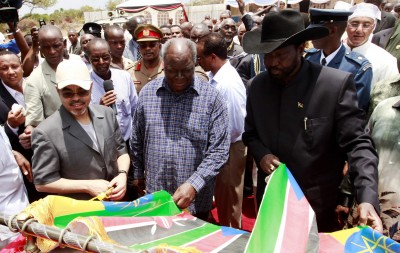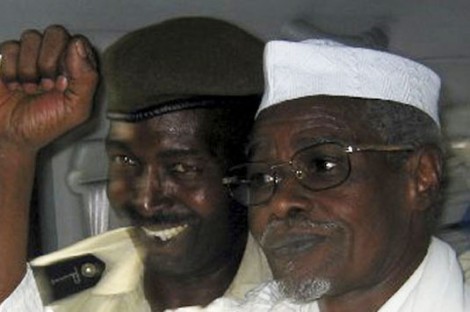New energy discoveries and greater investment in the energy sector sees East Africa becoming a world super power in energy in the not too distant future. The Ethiopian government, for example, has published an ambitious Growth and Transformation Plan (GTP) which will see it become a major energy exporter to neighbouring states. Kenya, Ethiopia and Southern Sudan are involved in the construction of a super-port at Lamu, and connecting their countries with oil pipelines. Meanwhile, natural gas and oil discoveries made off the coasts of Tanzania and Mozambique have Casey Research claiming that East Africa will become the world’s most important energy producer by 2040.
These projects and claims warrant further examination as East Africa is rarely known to be a super power of anything. As the region opens up to new energy investment and development, the tug of war between the US and China over the continent could flare up.
As part of the GTP, Ethiopia has begun constructing a 6 gigawatt hydroelectric dam called the Grand Renaissance Dam on the Blue Nile. The dam is set to be completed in 6 years and is intended to make Ethiopia Africa’s largest power exporter. Once completed, a portion of the electricity produced is intended for export to Sudan, Egypt and other surrounding states.
While the move has been greeted with enthusiasm in Ethiopia, its neighbours Egypt and Sudan face destabilization as the project, once completed, will significantly reduce the amount of water flowing into the Nile. It is important to note that the Nile is essentially Egypt’s lifeblood. Ethiopia’s Grand Renaissance Dam has thus been described by Cairo as a threat to its national security. U.S. security consultants Stratfor, as revealed by Wikileaks, have speculated that military action was not ruled out by Egypt. Such a move would only be taken if the dam was completed, because a large-scale reduction in water from the Blue Nile would be, “intolerable to any Egyptian government,” the report states.
The ultimate danger of any war between the two states would be to open up North Africa to even more unnecessary violence. The conflict would not last very long as the two states do not share a common border which means that Egypt would carry out precision air strike against the dam. Ethiopia would most likely retaliate by permanently cutting off Egypt from the Blue Nile. In the end both sides stand to lose significantly in a war, so it is incumbent upon the two sides to engage constructively to resolve the issue peacefully. In July 2012, shortly after taking office, Egyptian President Mohamed Morsi flew to Addis Ababa to negotiate a settlement to the Nile dispute in July of 2012. Then President Meles Zenawi, however, was not receptive and refused to compromise, insisting that there would be no changes to Ethiopia’s plans to dam the Blue Nile. The current Ethiopian government has not changed its position either as the dam has recently reached 13% of total construction. Ethiopia even claims the Egyptians have been pressuring donor countriesto withhold funding for the project.
LAPSSET: East Africa’s Gateway to the World Market
Ethiopia is also involved in an important regional energy project with Kenya and Southern Sudan called the Lamu Port South-Sudan-Ethiopia Economic and Transport Corridor (LAPSSET). LAPSSET is an ambitious project which ultimately seeks to deliver energy from landlocked Ethiopia and Southern Sudan to the East. When South Sudan seceded from Sudan it took approximately 70% of all Sudanese oil.
[captionpix align=”right” theme=”elegant” width=”320″ imgsrc=”http://natoassociation.ca/wp-content/uploads/2013/03/Lamu-e1362515342679.jpg” captiontext=”Kenya’s President Mwai Kibaki (Centre) with South Sudanese Salva Kiir (Right) and Ethiopian Prime Minister Meles Zenawi (Left) at the inauguration ceremony of the Lamu Port-South Sudan-Ethiopia (LAPSSET) project in Lamu.”]
The oil reserves, estimated to be 7 billion barrels, are South Sudan’s economic future. While South Sudan is in control of these reserves, it however has no refineries or pipelines to the world market. Since January 2012, due to a dispute in oil revenue sharing between Sudan and South Sudan, the South has shut down the oil wells, which have yet to be restarted. Meanwhile, China is losing out on approximately 6 percent of its energy consumption as the dispute continues.
LAPSSET is set on connecting both Ethiopia and Southern Sudan via pipeline to the port city of Lamu where crude oil can be refined and exported. The project is part of a larger Kenyan development program called Kenya Vision 2030. LAPSSET, a $24 billion project, will crucially include an oil refinery at Lamu capable of refining 120,000 Bpd and a super-port capable of accommodating post-Panamax vessels. The project is funded by the three involved states with China participating as well. China’s involvement should not come as a surprise as it was purchasing up to 70% of South Sudan’s oil before the shut down .
Mozambique and Tanzania: The New Mecca of Energy
If the discoveries made by Italy’s ENI in Mozambique are anything to go by, then there is no reason to doubt the Casey Group’s prediction. An open taxation regime and reasonable government take means that the region can expect greater external expertise to help develop the currently untapped resource. East Africa can be a safe and reliable source of energy for the world’s two hungriest consumers; China and the United States.
East Africa also has something the Middle-East has been short of for many decades; stability. The Middle-East produces an astounding amount of energy, but it is a powder keg. The importance of having a safe and reliable energy provider is best demonstrated by the current relationship between the United States and Saudi Arabia. Relying heavily on Saudi Oil, the US has for years overlooked some of Saudi Arabia’s more questionable actions, including the deployment of Saudi troops to help quell popular protests in Bahrain in March of 2011.
There is also growing speculation that the super oil fields of the world such as Saudi Arabia’s Ghawar and Mexico’s Cantrell are starting to run dry. Drilling in Kenya’s Lokichar Basin leads US financial service firm Morgan Stanley to state that the, “well results to date reaffirm the basin’s multi billion barrel size and support our belief of the region’s transformational potential.” Oil and gas transformed the Middle-East into a Mecca of riches. The region is wealthy today, but that wealth is largely squandered. Many governments, including those in the Middle-East seize up to 90% of the wealth that oil and gas resources provide. Excluding Uganda, East Africa’s take rests at the world average between 60-70%.
Major international energy firms are making new discoveries of ever more natural gas in Tanzania and Mozambique on a monthly basis. Mozambique has 4.5tcf of gas in reserves but if recent discoveries are confirmed it will rank fourth in the world for natural gas reserves just behind Russia, Iran and Qatar. Meanwhile, Tanzania has recently tripled its estimated recoverable natural gas resources to 29tcf. The majority of the gas is locked offshore and international firms like Shell, Exxon, Statoil, BP and Chevron are just waiting for more government offshore licensing agreements to explore and develop the resource further.
Mozambique is expected to dot its coast with brand new LNG ports as ENI and energy firm Anadarko are planning to construct the second largest LNG port in the world in the Cabo Delgado province. All in all the Casey report suggests that East Africa has the potential for 28 billion barrels of recoverable oil, 440 tcf of natural gas and 14 billion barrels of LNG. The area, the report concludes, is quickly becoming the most important region for oil and gas exploration today.
East African energy and infrastructure projects are on the cusp of raising the region to a whole new level of competitiveness. As this new energy is tapped, two great powers are increasingly raising the stakes to gain favour with the region. What is certain is the fact that East Africa is undoubtedly set to become more important to the conduct of world affairs. It appears that time is running short for the Middle-East, and East Africa is reasonably prepared to show the world how to leverage its energy potential.




